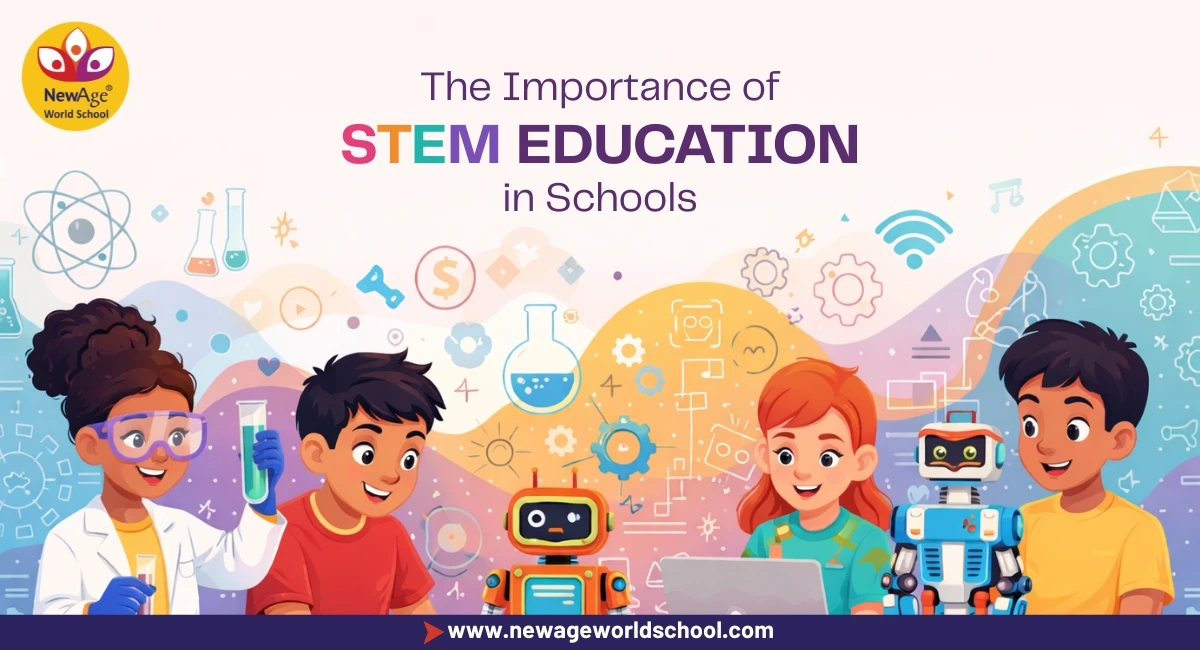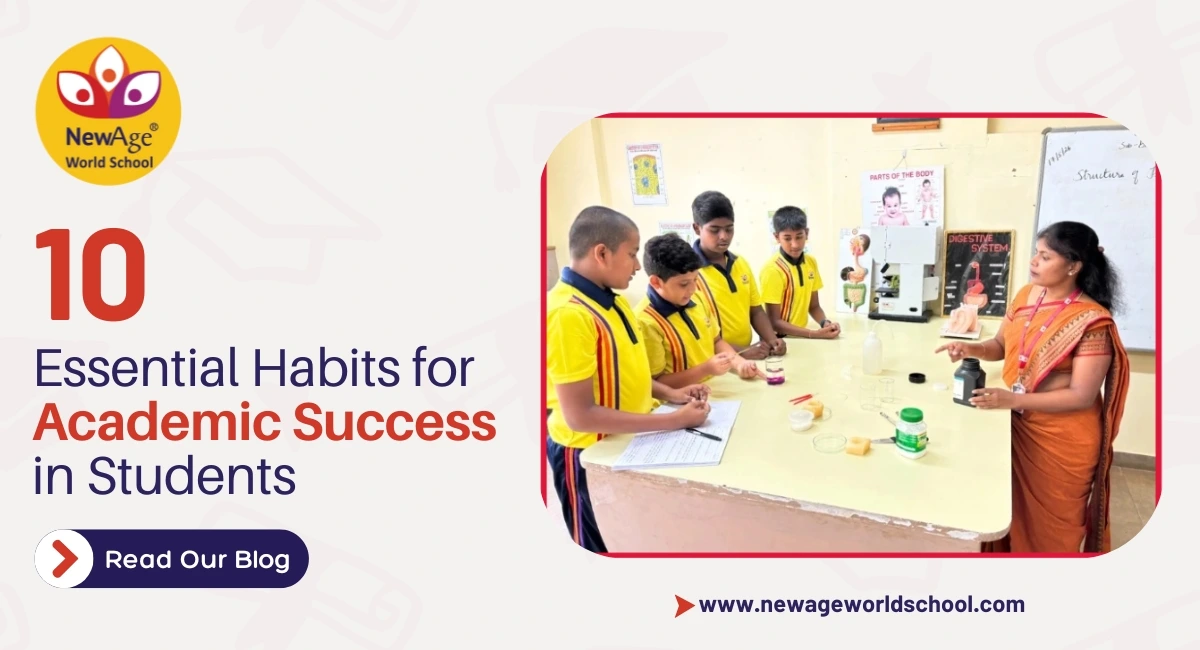Teaching Kids the Essential Life Skill of Saving Money – NewAge World School

Table of content
Introduction
Start with a Simple Piggy Bank
Open a Savings Account Together
Lead by Example
Set Small Savings Goals
Talk Openly About Money
Encourage Earning Opportunities
Teach the Difference Between Needs and Wants
Practice Patience and Delayed Gratification
Make It Fun with Games and Apps
Conclusion
FAQ
Introduction
Saving money is not something that kids naturally understand, yet it is one of the most important skills they can develop for their future. Building these habits early on helps children grow into responsible adults who understand how to manage finances. At NewAge World School, we believe that lessons in money management for kids are as valuable as academics. After all, understanding money from a young age lays the foundation for making wise financial decisions for children throughout their lives.
In this article, we will explore effective ways to teach kids the importance of saving money and practical tips to build this skill.
Start with a Simple Piggy Bank
A piggy bank may seem basic, but it is an ideal starting point for children. Watching coins and small bills add up teaches kids the idea of saving, giving them something they can see and touch. For younger children, a piggy bank makes financial education for children feel real and exciting. You can even place a picture of a toy or item they want on the piggy bank to remind them of their goal. This kind of visualization helps them understand that saving means reaching a reward, an idea we also encourage at NewAge World School as part of our approach to practical learning.
Open a Savings Account Together
Once they are ready to handle more than a piggy bank, opening a savings account is the next step. It is a great way to introduce them to the concept of financial planning for children. Taking them to the bank and letting them interact with the teller can help children feel a sense of responsibility. They will start to see that their money can grow over time if they do not spend it right away, a key lesson in teaching saving and spending wisely. This experience with real-world banking helps build a lasting foundation, and it is a part of our curriculum at NewAge World School to make financial education for children a meaningful part of everyday life.
For those interested in knowing more about our teaching style and what makes our school unique, check out this guide by Aksha Pandey on discovering the best ICSE school in North Bangalore.
Lead by Example
Children are natural imitators, often copying what they see adults do. When it comes to money management for children, showing them how you manage your finances can make a powerful impact. Let them see you budgeting, saving, and planning your spending. Explain simple concepts like sticking to a budget or avoiding impulse purchases. This is where parental guidance in money management plays a crucial role in helping children understand the value of wise spending and saving.
At NewAge World School, we always encourage students to ask questions, whether they are curious about money, academics, or life skills. By setting an example and involving them in everyday financial conversations, we give them a better sense of how money decisions are made and why it is essential to think about the future.
Set Small Savings Goals
Setting small, realistic goals makes the idea of saving more fun and achievable for kids. You could start with something simple, like saving for a toy or a special outing. When kids reach these goals, they feel a sense of accomplishment that motivates them to continue saving. This practice teaches them about setting targets and the importance of delayed gratification, an essential part of financial planning for children.
Talk Openly About Money
Money is often seen as a sensitive topic, but having open discussions with your children about finances can help them develop a healthy relationship with money. If your child asks questions like, "Are we rich?" or "Why can't I have that toy right now?" take it as a chance to teach them about the family's values, like hard work, responsible spending, and planning for future needs. These conversations can demystify money, showing kids that it is just a tool we use to meet our needs and wants.
At NewAge World School, we believe in the power of open conversations to foster curiosity and knowledge. In fact, this blog on what makes NewAge World School the best ICSE school in Yelahanka, Bangalore, shares our approach to fostering a well-rounded education that includes both academic excellence and essential life skills.
Encourage Earning Opportunities
Children learn best when they get hands-on experience. Letting them earn their own money can be an eye-opening experience that shows them the connection between work and earning. Small entrepreneurial activities, like running a lemonade stand, a bake sale, or helping with chores, teach them that money does not just appear out of nowhere—it is earned. This approach instils a work ethic and makes them appreciate their money even more, encouraging them to think twice before spending it on non-essential items.
Teach the Difference Between Needs and Wants
Understanding the difference between "needs" and "wants" is vital for children's financial decisions. Sit down with them and discuss what is essential (like school supplies) versus what is a "want" (like the latest toy). This sense of prioritization helps kids recognize that money should be spent on important items first. At NewAge World School, this is one of the lessons we emphasize in our financial education for children to help them learn about responsible spending.
Practice Patience and Delayed Gratification
Teaching kids to wait for things they want, rather than buying right away, builds patience and helps them value their goals. Delayed gratification can make them feel more accomplished and content when they finally reach their savings target. Encouraging them to practice patience is an investment in their happiness and a skill they will carry into adulthood.
Make It Fun with Games and Apps
There are plenty of interactive games and apps designed to make teaching kids about money fun and engaging. Many of these apps incorporate lessons on saving, spending, and budgeting in a way that feels like play rather than work. Introducing them to money management through these tools can help reinforce essential financial concepts in a fun, memorable way.
Teaching kids about saving money is not just about handling coins and bills—it is about shaping how they think about resources, goals, and future planning. At NewAge World School, we believe in nurturing well-rounded students equipped with the skills they will need for the real world. By guiding them on how to save and make smart money decisions, we are investing in their future success and well-being.
If you are looking for a school that values life skills as much as academics, NewAge World School in Yelahanka is an excellent choice. As one of the Best International Schools in Yelahanka and a leading name among ICSE schools in Yelahanka, we are committed to providing an education that prepares children for all aspects of life.
Conclusion
Saving money might seem like a small lesson, but it is one of the most valuable gifts you can give your child. With the right tools, habits, and parental guidance in money management, they will grow up with the skills to make smart choices, avoid debt, and build a secure future. Remember, every penny they save today is a step toward financial independence tomorrow.
Admissions are open for the academic session 2025-26 at NewAge World School. You can find more information about our school, curriculum, and admission on our official website.
Click here to apply now.
Frequently Asked Questions
Should parents teach children to save money?
Yes, teaching kids to save is crucial. It helps them develop essential money management skills, setting them up for financial success in adulthood.
How to teach kids the value of money?
Discuss the difference between needs and wants, lead by example, and encourage earning opportunities to show them the effort behind earning and saving money.
What is the lesson we can learn about saving money?
Saving teaches patience, planning, and goal-setting, helping children grow into financially responsible adults.
How to teach kids save money?
Start with a piggy bank, set small savings goals, and consider opening a savings account together. These steps help kids understand and appreciate the habit of saving.

















Leave a Reply
Your email address will not be published. Required fields are marked *
Comments
No comments available